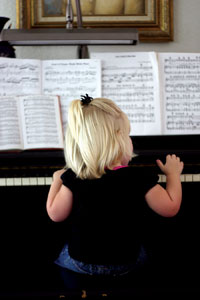 You want your little one to have a great musical education, but where do you start? The options are many for preschoolers; here’s a little help narrowing down your choices.
You want your little one to have a great musical education, but where do you start? The options are many for preschoolers; here’s a little help narrowing down your choices.
Let’s start at the very beginning. The do-re-mi of music lessons can be divided into two types: private and group. For preschoolers, being a part of a group music lesson can be more fun — and more social! But if you want your child to learn how to play a specific instrument, it is time to explore private lessons.
Private music lessons for kids
Does your child need one-on-one time with an instrument specialist? This is called a private lesson, and it usually lasts about 20–30 minutes at this age. The two most popular instruments are piano and violin. Violin is especially good for young kids because they come in child-appropriate sizes. If a woodwind or brass instrument is in your child’s future, the recorder will develop the coordination between finger movement and breathing, and is a very inexpensive first step. Whatever the instrument, finding a private teacher who will take on a very young student may be difficult; many will want the child to be able to read.
When looking at private lessons for preschoolers, many parents seek out a teacher who uses the Suzuki method, which is based on the teachings of Shinichi Suzuki. Note reading is delayed; Suzuki believes children should develop basic technical competence on their instruments before being taught to read music. Parental responsibility, loving encouragement and constant repetition are some of the special features of the Suzuki approach.
Materials are available for violin, viola, cello, bass, piano, flute, harp, guitar and recorder. Parents play a big part in the Suzuki approach and often learn the instrument right along with their child.
Group lessons for kids
My, oh my, has the world changed since you were a child! Kindermusik, Musikgarten and Music Together are a few of the group music classes readily available for the preschooler. Each of these curricula focuses on the base of the musical tree, where children learn general music concepts that lead to music appreciation and future success on an instrument or an ensemble.
Group lessons are most often given over a period of 12 to 15 weeks and are 45 to 60 minutes long. Most children become accustomed to the class routine and their classmates around the fifth or sixth week and at this point, their participation is likely to increase. But whether they are outwardly participating or not, children are still assimilating important music information in the group lesson.
The parent is often a part of the class itself, usually for the last 10 or 15 minutes. You may feel that you are not particularly musical or call yourself “tone deaf,” but the kids don’t care! Whatever the level of your musical skill, you can still model openness, interest and a desire to participate in musical activities.
How parents can help
Whether lessons are private or group, research supports the idea that you should get involved with your child’s musical education. A study conducted at Sam Houston State University in Texas finds that parental involvement can greatly affect a child’s musical improvement. In the study, children whose parents took part in their music classes for at least 30 minutes per week scored significantly higher on musical skills tests than the children who did not receive this level of parental assistance.
Finding the right music teacher for your child
Here are three steps to help you as you search for a great music teacher:
1. Get referrals from friends, school music teachers or music stores.
2. Ask for and observe a free “demo” class or lesson.
3. Repeat no. 2 with a different teacher.
Yes, it’s that important! And ask yourself: Do you like the teacher’s singing voice? You will be hearing it a lot! Is your child excited to share things with you in the car after class? You know your child best, and from these demos, you will have the information needed to be confident enough to commit to a group of lessons.
Doing your homework before you begin will give you the best guarantee that your child will have a joyful experience and the beginnings of a lifelong love of music.
Linda Sebenius is a “Maestro” music teacher, music director for Music Shine Media, and performs in “Let Your Music Shine! with Lisa & Linda.”









